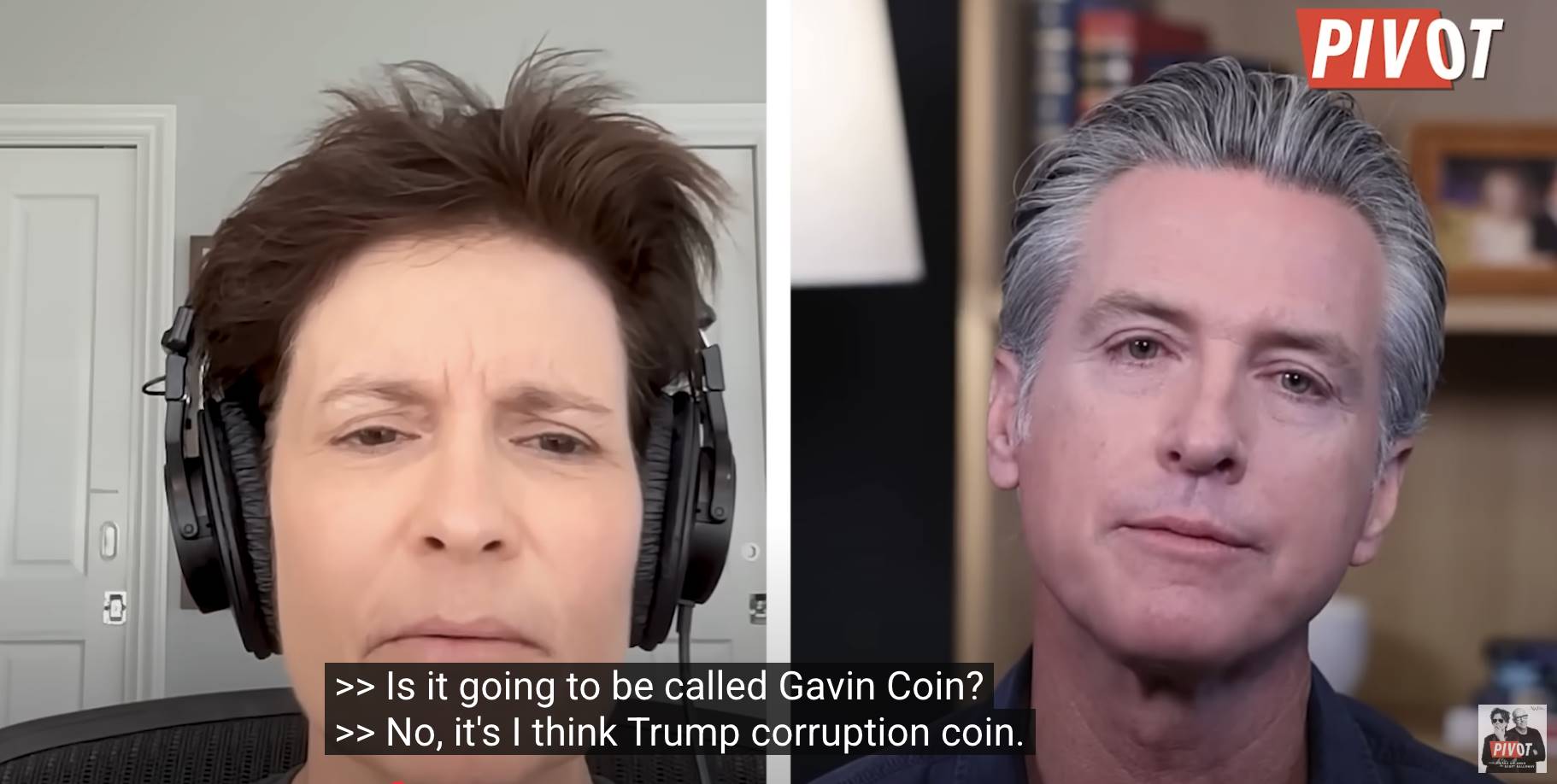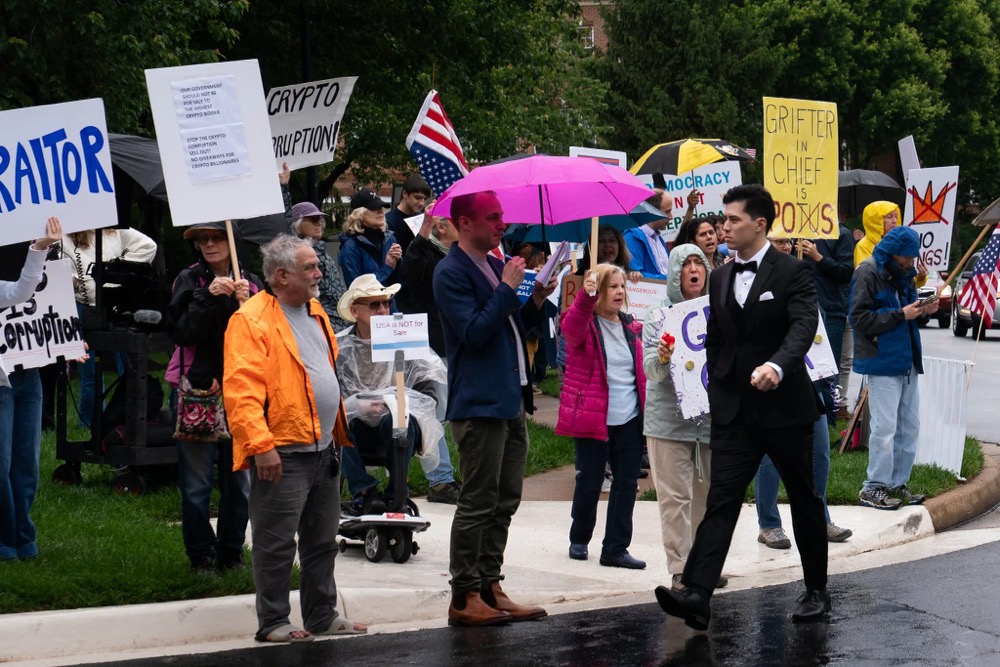A federal country that seems to embrace Crypto is actually rife with undercurrents.
Written by: Eric, Foresight News
Current California Governor Gavin Newsom has had ongoing conflicts with current U.S. President Donald Trump in recent years.
Recently, Newsom announced on the podcast Pivot, hosted by tech journalist Kara Swisher and NYU professor Scott Galloway, that he plans to issue a "Trump Corruption Coin" to satirize Trump's use of cryptocurrency for personal gain.

In the podcast, Newsom's criticism of Trump was sharp, and this "deep-seated hatred" has not developed overnight. The months of tension between the two reflect the outcry of many Americans who are appalled by Trump's abuse of power for personal gain, as well as a microcosm of the ongoing rivalry between the Democratic and Republican parties.
The controversy surrounding Trump's "corruption" has a long history. According to a Washington Post investigation, the Trump International Hotel hosted official delegations from at least 47 countries between 2017 and 2020, with the Saudi Arabian government spending over $270,000 at the hotel, while the U.S. government approved $110 billion in arms sales to Saudi Arabia during the same period. Such behavior, exchanging favorable policies for business returns, is shocking.
During his term starting in 2025, the Trump family is best known in the Web3 industry for issuing the meme token TRUMP and launching World Liberty Financial. According to the New York Times, as of July 1 this year, Trump and his partners held $6.9 billion worth of TRUMP and owned 15 billion WIFI through World Liberty Financial. In the presale of WIFI, individuals and institutions, including Sun Yuchen, DWF Labs, and Aqua 1 Foundation, generously contributed.
In late May this year, Trump hosted a banquet at a private country club in the Washington suburbs for the top 220 holders of TRUMP tokens, hoping to attract a group eager to "climb the social ladder." Before the banquet began, many rushed to buy TRUMP tokens. However, the outcome surprised many; Trump himself only made a brief appearance and delivered a bland speech, and there were no promised opportunities for "close contact" with Trump. The banquet's food was so ordinary that it left attendees speechless. Such behavior from a sitting president also sparked public protests.

A White House spokesperson insisted that the Trump family's actions in cryptocurrency were led by a family trust and had nothing to do with Trump himself. In fact, the TRUMP and WIFI tokens are just the tip of the iceberg in the "corruption" associated with Trump during his presidency.
Since the beginning of the year, the most controversial event involving Trump was the U.S. Department of Defense's announcement on May 21 that it accepted a $400 million private jet gifted by Qatar. Xinhua News Agency reported that critics pointed out that the president's acceptance of high-value gifts from foreign governments may violate the "Emoluments Clause" in the U.S. Constitution, which prohibits federal officials from accepting gifts from foreign governments without congressional consent, aiming to prevent government officials from developing favorable feelings towards the gifting country due to valuable gifts, thus leading to foreign policy decisions that deviate from national interests.
Trump, relevant U.S. government officials, and Qatari officials all argued that the plane was donated to the United States rather than to Trump personally. The Democrats seized the opportunity to attack, with Democratic members of the House Judiciary Committee stating that they had launched an investigation into the matter, demanding legal documents from the Trump administration to explain the legality of accepting the plane.
Similar examples have emerged in abundance within just a few months. After taking office, Trump abolished a 50-year-old government ethics standard, dismissed oversight personnel, and relaxed restrictions on lobbyists and foreign bribery; he limited the enforcement of the Foreign Corrupt Practices Act under the guise of "national security," effectively protecting U.S. companies and associated politicians from overseas bribery.
Moreover, Trump has also provided ample support to the "big donors" who helped him win. Trevor Milton, the founder of the American electric vehicle startup Nikola, was sentenced to prison for defrauding investors but was pardoned due to his and his wife's $1.8 million donation to Trump's campaign. Jared Isaacman, a major investor in Elon Musk's SpaceX, also became the youngest NASA administrator with the support of Musk and Trump. Musk himself was granted "special government employee" status, allowing him to avoid asset disclosure and conflict of interest reviews. Of course, their eventual fallout is another story.
The New York Times commented in "Why Aren't Americans Angry About Trump's Abuse of Power?" that Americans may have become numb to the president's self-serving behavior, which has, to some extent, become a "hidden rule." Using Trump's son's words, his low-key actions during Trump's first term were criticized, suggesting that it is better to act openly. Michael Johnston, a retired professor from Colgate University and author of several books on American corruption, stated, "I have been studying and writing about corruption for 50 years, but I am still shocked." Even with Trump's high-profile actions, unless the Democrats intend to use this as an excuse to try to bring him down, the Republican Party and the interest groups behind it are an iceberg that is difficult for any individual or organization to easily shake.
Current California Governor Newsom seems to be the most likely "fighter" to take on Trump.
Since taking office in 2019, Newsom has been a staunch supporter of the Democratic Party. He immediately signed SB 54, a bill prohibiting state police from cooperating with U.S. Immigration and Customs Enforcement (ICE) to apprehend illegal immigrants. Subsequently, the Trump administration sued California for being a "sanctuary state," threatening to cut federal funding. Newsom firmly retorted, "If you dare, come to California to arrest people." After a second trial, the federal court ruled that the White House must continue to provide funding, but California must also submit some data. Thus, a rift was formed between the two.
After that, the two frequently exchanged barbs, but the event that completely broke Newsom's defenses occurred in June of this year.
More than two months ago, an ICE raid on an immigrant community sparked unrest, and Trump, without Newsom's consent, ordered the deployment of 4,000 National Guard troops and 700 Marines to Los Angeles. Upon seeing this, Newsom immediately sued Trump and the Secretary of Defense for constitutional violations and joined 22 Democratic governors in condemning the "federal abuse of military power." Since then, their mutual disdain escalated into a cyber war of insults. In the aforementioned podcast, Newsom did not hold back in his criticism of Trump.

From immigration to military deployment, the conflict between Newsom and Trump has long transcended mere policy differences; it represents a systemic confrontation between federal centralization vs. state autonomy, red America vs. blue America. Newsom, who has repeatedly stated that he is not interested in the presidency, has for the first time this year suggested the "possibility of running for office," and the potential showdown between the two in the 2028 presidential election makes this "California vs. the White House" drama increasingly resemble a presidential prelude.
Recently, some have suggested that Trump's shocking move to invest in Intel is part of a plan to implement "state capitalism" to save America, but there is a significant conflict between the long-standing culture of free markets and this policy. Trump's unconventional tactics have indeed produced some effects, but they have also brought corruption into the open, with cryptocurrency inadvertently becoming a beneficiary of political struggles.
Nevertheless, despite strong support for cryptocurrency from the U.S. Congress, many state cryptocurrency reserve bills have failed to pass the governor's desk. Lobbying from the Web3 industry is a significant source of campaign contributions, and the current support for Web3 in the U.S. is likely beneficial for industry development but may not necessarily stem from "good intentions." A federal country that seems to embrace Crypto is actually rife with undercurrents.
免责声明:本文章仅代表作者个人观点,不代表本平台的立场和观点。本文章仅供信息分享,不构成对任何人的任何投资建议。用户与作者之间的任何争议,与本平台无关。如网页中刊载的文章或图片涉及侵权,请提供相关的权利证明和身份证明发送邮件到support@aicoin.com,本平台相关工作人员将会进行核查。




